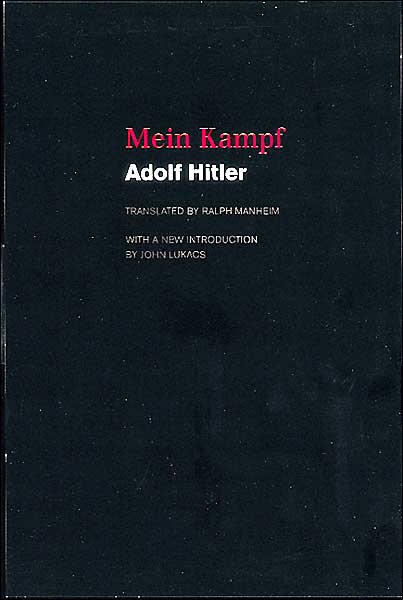
I was sitting on the floor in a Barnes and Noble the other day, gazing down at one of the bottom shelves of the history section to see Hitler’s Mein Kampf. At first I was surprised that it was just there, at a book store, ready to be bought and read by anyone. I was simply fascinated, knowing all I do about the racist ideology of the Nazis and the Nazi genocide, to realize that the hateful, repugnant, destructive and propagandized words of mass murderer and tyrant Adolf Hitler were just there, for sale.
Mein Kampf has been banned in Germany since the end of World War II and in many other countries at different points in time. Most recently, it was banned in Russia due to a spike in violence by far right extremist groups thought by the government to be aided on some level by Hitler’s text. It is of course, legal to publish and sell in the United States, as well as various other countries; it is an important historical text that scholars and the like can use responsibly to study Hitler and the Third Reich—of course some will use the text irresponsibly, but as is the case with any political text, thinking or idea.
When the 2015 cutoff for the ban in Germany rolls around, the Institute of Contemporary History in Munich plans to release a version of Mein Kampf that includes critical commentary and annotations. In Germany, although the ban is in place, those who really want to read the work can get their hands on it—multiple unofficial versions are available online. Lifting the symbolic ban and taking steps to release the annotated version as well as regular, unannotated versions will be positive steps for the German government; the annotated version will inform the reader of the brutal realities and dangerous nature of the text, while the unannotated versions will preserve freedom of thought for the reader, a concept of fundamental importance. In other words, balance is key when the German government releases a new policy on the matter. (The different takes on the planned ban lift are outlined in a New York Times Article from February).
In the same breath that I say Mein Kampf should be made available for the public in Germany and elsewhere, I must address various news articles that sprung up earlier this year discussing this topic and India, which leave me back at a point of utter confusion. The headline on the Huffington Post’s website from April reads, “Hitler’s Mein Kampf Seen as Self-Help Guide For India’s Business Students.” I have not read Mein Kampf, but the knowledge I have of it allows me to say, with conviction, that Mein Kampf should not be used as a tool for self-help or self improvement—as the Daily Telegraph put it in the original story—personal guidance or career advancement in any way. The Daily Telegraph article cites that the book’s popularity in India may also be due to the political convictions of some Hindu nationalist and fascist organizations. Whatever the mix of factors be that contribute to the rise of popularity, these articles show probable connection between Mein Kampf, Indian business students and misuse of a dangerous text—one which prompted genocidal violence and ideology.
It is considered, by a growing number of business students in India, as a guide to management, and as the Daily Telegraph cites the owner of an Indian company that publishes Hitler’s text, “[Students] see it as a kind of success story where one man can have a vision, work out a plan on how to implement it and then successfully complete it.” Knowing the racist and destructive contents of Mein Kampf, the eventual Nazi policies of eradicating all “Non-Aryan” peoples, which reflected Hitler’s views in Mein Kampf, and the genocide committed by Hitler and his regime all make the previous statement perplexing and disturbing. This “plan” that the owner mentions was one centered around mass murder, taking over the world and attempts to create a superior race. Hitler’s plan and the words behind his actions in Germany—Mein Kampf—should not be looked to in hopes of emulation for any purpose. Hitler's writing, which is so entrenched in racist hatred, is particularly dangerous due to its deep connections with genocide. It is this connection with the most horrific and terrifying type of human catastrophe that forces particular notice be taken of Mein Kampf and its potential reckless mishandling.
No comments:
Post a Comment